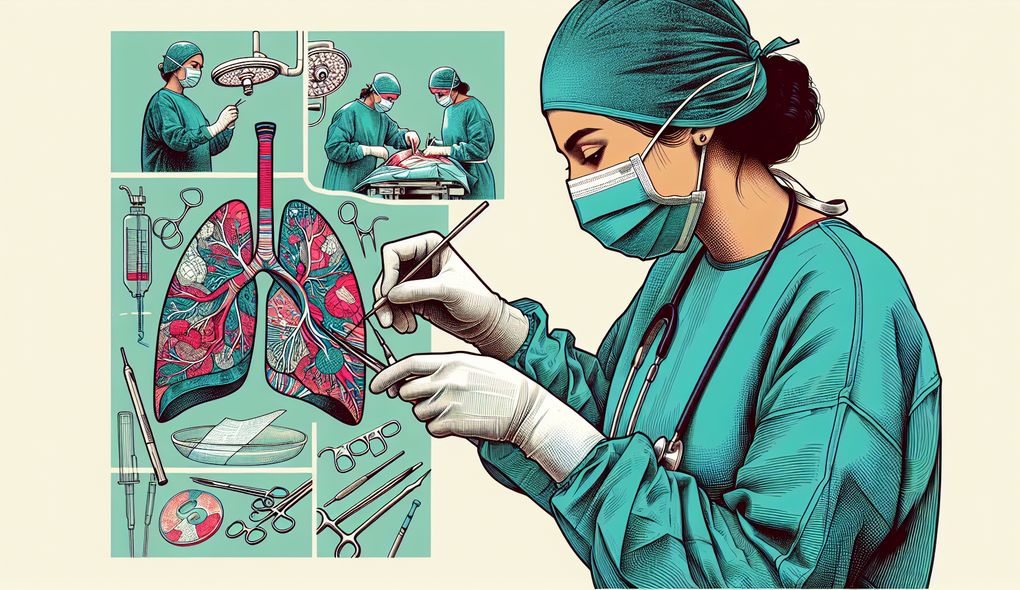Describe a situation where you encountered a challenging patient case and how you approached it.
INTERMEDIATE LEVEL

Sample answer to the question:
I once encountered a challenging patient case where the patient had multiple complications after thoracic surgery. The patient had developed an infection, respiratory distress, and cardiac issues. To approach this situation, I collaborated with a multidisciplinary team including physicians, nurses, and respiratory therapists. We closely monitored the patient's vital signs and adjusted their medication and treatment plan accordingly. I communicated with the patient and their family, providing regular updates on their condition and addressing any concerns or questions. Through our collective efforts, we were able to stabilize the patient's condition and successfully manage their complications.
Here is a more solid answer:
I encountered a challenging patient case where a thoracic surgery patient developed complications of respiratory distress and atrial fibrillation. To approach this situation, I relied on my advanced surgical skills to assess the patient's condition and make critical decisions under pressure. I initiated immediate interventions to stabilize the patient's respiratory status, including administering oxygen therapy and adjusting the ventilator settings. I collaborated closely with the respiratory therapists to optimize the patient's lung function. Additionally, I coordinated with the cardiologist to manage the atrial fibrillation and prevent any further cardiac complications. I maintained excellent communication with the patient and their family, providing updates on the treatment plan and addressing their concerns. I utilized medical software to monitor the patient's vital signs, review imaging studies, and adjust the medication regimen. Throughout the process, I demonstrated a commitment to ongoing education and research, staying updated on the latest advancements in thoracic surgery and incorporating evidence-based practices into the patient's care. With my high attention to detail and precision in surgical techniques, I ensured that every decision made and intervention performed was carefully considered and executed. By applying critical thinking and problem-solving skills, I was able to successfully manage the patient's complications and facilitate their recovery. Throughout this challenging case, I maintained empathy and compassion for both the patient and their family, providing emotional support and reassurance during a difficult time.
Why is this a more solid answer?
The solid answer provides more specific details about the surgical skills utilized, decision-making process, and communication strategies. It highlights the collaborative approach with other healthcare professionals and the use of medical software in patient management. It also addresses the commitment to ongoing education and research, attention to detail, and problem-solving skills. However, it can be improved by including more information about the patient's response to treatment and the final outcome.
An example of a exceptional answer:
In one challenging patient case, I encountered a thoracic surgery patient with multiple complications, including postoperative bleeding, pulmonary embolism, and sepsis. This complex situation required a multi-faceted approach. I immediately initiated bleeding control techniques in the operating room, ensuring hemostasis and preventing further blood loss. Simultaneously, I coordinated with the interventional radiologist to insert a retrievable inferior vena cava filter to prevent further embolic events. In the ICU, I closely monitored the patient's hemodynamics, respiratory status, and infectious parameters. I collaborated with a team of hematologists, intensivists, and infectious disease specialists to develop a tailored treatment plan. Using my knowledge of thoracic anatomy and pathology, I performed bedside thoracentesis to remove the infected pleural fluid and optimize lung expansion. I closely monitored the patient's response to treatment, adjusting antibiotics and supportive therapies accordingly. Throughout this challenging case, I maintained a high level of communication with the patient and their family, providing detailed explanations of the treatment plan and addressing any concerns. I also actively engaged in ongoing education and research, attending conferences and participating in journal clubs to stay updated on the latest advancements in thoracic surgery. My attention to detail and precision in surgical techniques ensured that each intervention performed was meticulously executed. By applying critical thinking and problem-solving skills, I successfully managed the patient's complications and facilitated their recovery. Throughout the entire process, I demonstrated empathy and compassion for the patient and their family, providing emotional support and reassurance during a difficult and uncertain time. Ultimately, the patient showed improvement in their condition and was discharged with follow-up care.
Why is this an exceptional answer?
The exceptional answer provides an in-depth description of the surgical skills utilized, decision-making process, and communication strategies. It emphasizes the collaboration with other healthcare professionals and the use of specific interventions for each complication. It also highlights the ongoing education and research efforts, attention to detail, and problem-solving skills. Additionally, it addresses the patient's response to treatment and the final outcome, demonstrating the candidate's ability to handle complex cases and achieve positive results.
How to prepare for this question:
- Review and refresh your knowledge of thoracic anatomy, physiology, and pathology.
- Reflect on past challenging patient cases and analyze your approach and outcomes.
- Stay updated on the latest advancements in thoracic surgery through continuous education and research.
- Practice effective communication skills, including providing clear explanations to patients and their families.
- Develop critical thinking and problem-solving abilities by engaging in case discussions and participating in journal clubs.
- Demonstrate empathy and compassion in patient interactions to build trust and provide emotional support.
What are interviewers evaluating with this question?
- Advanced surgical skills specific to thoracic procedures
- Strong decision-making abilities under pressure
- Excellent communication and interpersonal skills
- Ability to work as part of a collaborative healthcare team
- Skill in using medical software for patient records and surgery planning
- Commitment to ongoing education and research within the field
- High attention to detail and precision in surgical techniques
- Critical thinking and problem-solving skills
- Empathy and compassion for patients and families

